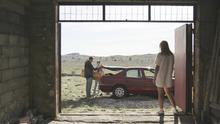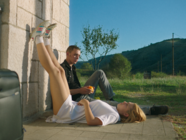14Nov
Ena Sendijarević: I want Bosnian youth to start telling their stories
Ena Sendijarević, film director from Bosnia and Herzegovina living in Amsterdam, is the author of several award-winning short films, including Fernweh (2014) and Import (2016) which were shown at ZFF. This year, she is presenting her first feature film Take Me Somewhere Nice, which won the Best Film Award at Sarajevo Film Festival.
Interview by Nino Kovačić
Your short film Import is a story about leaving for a new country and muddled identity. Did the idea for your feature debut Take Me Somewhere Nice originate from it?
The short film Import was about a Bosnian family coming to the Netherlands and with it, I wanted to show the first steps of integration which are complex and sometimes absurdly comical. Going in the opposite direction, Take Me Somewhere Nice isn’t so much a film about Bosnia, but about the space between different worlds and that actually makes it a very Dutch film. Of course, I had to deal with Bosnian peculiarities and it is difficult to find a balance because I filmed a stylized, non-existent world in a real country. Such a reduced construct of Bosnia was more important because I wanted to be open about my manipulating reality as a filmmaker, and that the perspective in the film is very subjective.
Styling the film means enhanced adjustment of real filming conditions, most of all in framing and set design. Kitsch plays a big role in the film, but also the decision to format the film at 3:4, as well as the choice of music: all of it speaks about a specific generation?
When I decided to play with the absurd and to create weird elements for the audience, I didn’t want to play with empathy, but with alienation and humour. Those ideas were Brechtian and I wanted those theatre ideas implemented in film. That’s why I found Fassbinder especially close, because he used Brechtian ideas in a comical and playful way. In my film, acting is detached so actors are more doll-like. I didn’t want hyper-realistic characters, but for them to be seen as people who say the words thought up by someone else, so we feel a barrier between them and what they say. Generally, we think a lot every day, but when we realize our thoughts we can understand that a lot of them don’t come to us from ourselves, but we pick them up at random from all around us. A big part of the movie was shot with a 25 mm lens which adds to the weirdness and alienation, and set design was supposed to be minimalist and kitschy because I didn’t want to create a world with too many “flavours”. That’s why I opted for a 3:4 arthouse format because I wanted to portray the Instagram generation characters as subordinate to the same format.
How does your subjective, absurd and humorous approach adds to the change of perspective in the questions of identity and emigration?
I wanted to deal with identity, migration and tensions between East and West, but in a playful way because I feel that it is mostly talked about in sad tones. In doing so, I wanted to explore the relationship between migrants and their native country because there is a perception that people with two countries have the best of both worlds, but in reality, it means a lot of life complexities. I created a stylized world and used humor because I wanted to directly show to the audience that that world is construed, as is our everyday life, which means it is possible to create new worlds from it. Reality is just another absurd possibility and it is possible to change perspectives, especially when dealing with questions of identity. Such an approach does not victimize migrants, which is the case in the pity narrative. In addition, it was important to focus on the post-war generation because I think that the Bosnian cinematography is still focusing on war stories which, although very important, make it hard for the voices of young people to be heard.
These ideas are comprised in the main character, Alma, who in this road movie goes on an adventure of growing up, and besides exploring her new reality, those experiences do not seem so culturally different as much as they are emotionally and sexually charged, which really makes her an ordinary teenager. Why did you decide that the inexperienced Sara Luna Zorić should take on such a demanding role?
Alma somehow tries to connect with the country of her origin, which is harder than expected, and moves from one absurd situation into another, and in the end, she accepts the complexities of that relationship. The actress was supposed to be both Bosnian and Dutch, and that diaspora is not large and is tightly connected. Sara Luna is the type of person I needed because she doesn’t feel like she completely belongs to the Dutch, but also to the Bosnians who maintain a strong tradition and memory of the old country. In that sense, she also represents a specific group of people all over the world, a new generation which does not want to identify with one country and is open to the world, but the same is bothering them because they sometimes feel like they have to choose. With her I immediately felt that rebelliousness and confusion in questions of identity, which is also normal for the transition into adulthood. I was rooting for her rebelliousness to persist instead of pure choices, and she constantly inspired me through her work on the film.
The two young men carry their roles excellently as well, like Alma, in an almost theatrical, detached way of acting, and together they form a likeable antihero trio. How did you decide and work on acting?
From the beginning we had to build up a great mutual trust for the thing to work. Of the three main actors, only Lazar Dragojević, who is playing Denis, is a drama student, and the other two are naturals. Ernad Prnjavorac was an extra at first, and when I offered him the role, he wasn’t sure if he wanted to act at all, so he needed to be convinced, which only made me want him more because I needed his reticence for the role of Emir. The film has antiheroes: lazy, selfish, lost in materialism and inanity, because I can identify with such people more easily than with heroes, and what I’m interested in are the relations of power and how the characters see themselves between themselves. I’m hoping that with charming antiheroes instead of sorrowful victims I can bring new energy which will inspire people to use their imagination to express themselves and discover their realities.
How much of Alma was also in you?
My relationship towards Bosnia is different from hers, because I lived there for the first five years of my life, when my family migrated because of the war. Alma is a typical Westerner with roots elsewhere, like so many girls in the West. Since I feel a strong connection with Bosnia, I could delve into my own identity because it is a film about a dual identity from the perspective of an Eastern and Western country, but primarily a film about Europe, a film crossing national borders. I am more Dutch, and am actually a foreigner in Bosnia, and sometimes I feel schizophrenic when it comes to nationality. Although it is not fair to to show the dysfunctionality of that country, 60% of young people in Bosnia are unemployed and I feel they are discouraged from taking lives into their hands and change the situation in the country. I hope that maybe this film and my attempt to twist Balkan stereotypes and cliches in order to depict them as something that can be changed will encourage them to become more rebellious and start telling their own stories which will build a new reality.






